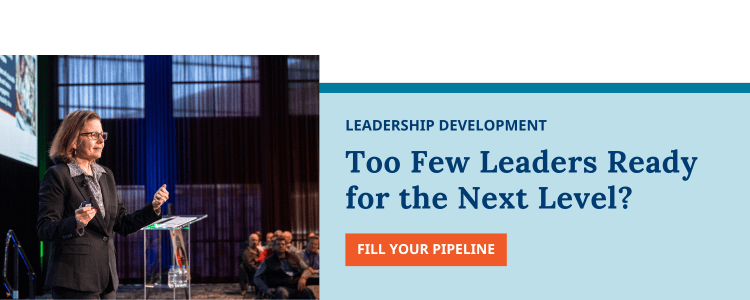HR trends are constantly changing from year to year, but one thing that isn’t changing? The reality that every organization’s future depends on its ability to identify, develop, and retain top-tier talent.
With the continued rise of AI, unpredictable labor markets, and ongoing debate over remote vs. onsite work, the next five years are sure to bring more changes to how HR and L&D teams operate. Here are six trends shaping the future of talent management that the pros are sighting now.
HR Trend No. 1: A Surge in Microcoaching paired with Online Training
The shift to hybrid work, combined with ongoing economic uncertainty, has led many organizations to adopt online learning. It offers a more cost-effective alternative to traditional in-person training, allowing for more personalized learning experiences and enabling employees to learn anytime, anywhere. Given the increasing demand for these benefits, the corporate e-learning industry is projected to grow by 20% annually through 2030.
Online learning is an especially attractive solution for training middle and frontline managers. When paired with microcoaching, online training has greater impact, and it gives managers opportunities to reflect and act on what they’ve learned. We believe that as more organizations recognize the long-term benefits of this approach, it will become the go-to leadership development solution for managers at any level.

HR Trend No. 2: Human-Centered AI Throughout the Talent Cycle
AI is now a part of nearly every aspect of life, and the workplace is no exception. Job seekers use AI to polish their resumes, employees get advice from AI chatbots to select health benefits, and HR teams incorporate AI tools in a range of pre- and post-hire activities, including:
- Automating candidate screening and onboarding workflows
- Identifying development opportunities based on employee performance and skill data
- Exploring layoff alternatives during reduction-in-force (RIF) scenario planning
AI HR software helps teams make faster, data-driven decisions, but it should never replace human expertise and judgment. In fact, the real value of AI in HR shines through when it’s used to enhance human connections. AI will undoubtedly become more sophisticated over the next five years, and we believe HR teams that balance it with the human touch will achieve the most meaningful outcomes.
HR Trend No. 3: Increase in Boomerang Employees
Boomerang hires—employees who leave a company and later return—are on the rise. ADP Research reveals that it’s a trend occurring in nearly every industry, with 2025 payroll data showing boomerang employees comprise 35% of new hires, up from 31% in 2024.
Boomerang workers bring valuable institutional knowledge, take less time to onboard, and help save on recruitment expenses. As more organizations recognize the value of hiring these returning employees, HR leaders will have new opportunities to revisit exit interviews, strengthen alumni networks, and refine rehire policies. As a result, organizations will be better-positioned to welcome back top talent when the time is right.
Rehires – especially those who left your organization and gained new experiences elsewhere — are helping organizations win the talent game. Taking a new job, then returning means they are bringing new skills and fresh ideas. This trend is causing many HR teams to beef up the strategic use of outplacement, so that when talent leaves, they have good feelings about the brand, are able to secure new top jobs, and keep the door open to return.
HR Trend No. 4: RTO Mandates Redefined by Culture
Despite employees’ desire to continue working from home, companies are increasingly calling employees to Return To the Office (RTO) in favor of a hybrid work environment. Many leaders argue that fully remote work weakens company culture by limiting connection, stifling innovation, and creating silos. However, as HR Grapevine reports, research has found the opposite: it’s not where people work that shapes culture; it’s culture that shapes how they experience work.
Though a KPMG study found that 83% of CEOs expect a full return to office within the next three years, hybrid and remote work are likely here to stay. When HR teams design employee experiences that support a culture of workplace flexibility, connection, and trust, more employees may come to embrace hybrid work as an environment where they can thrive.
HR Trend No. 5: Coaching & Gamification become Pillars of Development
Gamified learning experiences motivate employees to master new skills in an interactive environment. After all, learning while earning badges and points feels more like a game, new concepts are more memorable, and it just feels more like fun. Gamification is equally beneficial to the organization as a whole, as many companies using gamified learning report higher completion rates and improved post-training employee productivity.
Similarly, coaching is a learning and development solution that enhances learning and supports lasting behavior change. Where reaching the top of a leaderboard gives employees a sense of achievement, working one-on-one with a coach imparts personalized guidance that employees can practice and apply on the job.
HR Trend No. 6: Expansion of HR Analytics
Simply put, HR analytics provide visibility into what drives employee engagement, performance, and retention. By integrating big data, AI, and data science, HR teams can uncover patterns and predict outcomes with greater accuracy.
In the future, HR teams will have even more advanced analytic tools to tell stories that improve people decisions, inform hiring, and drive action. In some cases, these deeper insights may lead to the broader adoption of self-service analytics, empowering more leaders across the organization to access and act on people data.
Get Ahead of These Trends Now
The next five years will bring continued change and opportunity for HR and L&D teams. Staying ahead will mean embracing new technologies, rethinking traditional approaches, and preparing organizational leaders to guide their teams through uncertainty.
IMPACT Group’s global network of coaches and leadership development solutions can help your organization navigate these changes with confidence.
Contact us today to learn how we can support your leadership development goals and prepare your teams for what’s next.